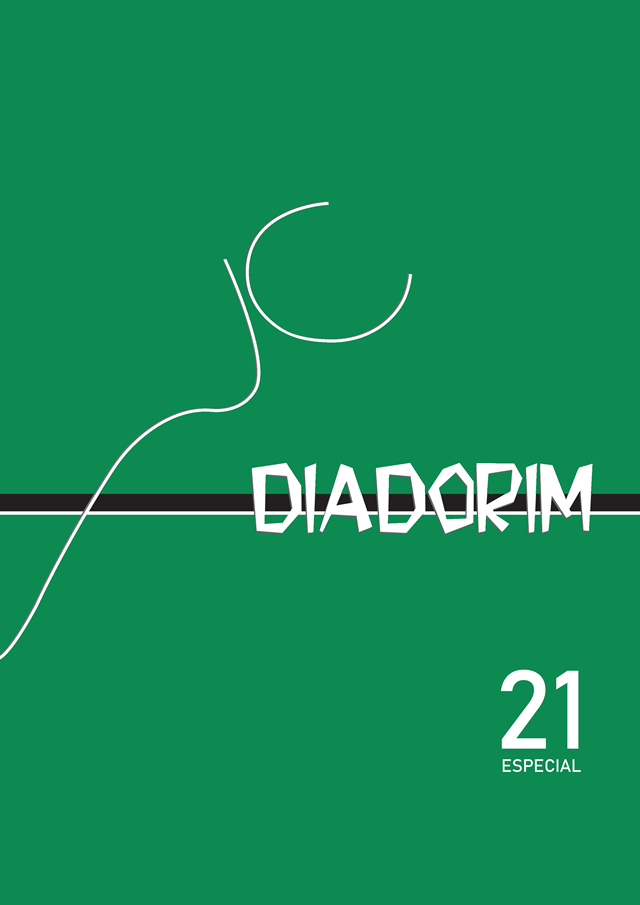Sowing Women, Harvesting a Nation: Rethinking Mozambican Female Discourses in Paulina Chiziane’s Niketche: Uma História de Poligamia
DOI:
https://doi.org/10.35520/diadorim.2019.v21nEspa28414Palavras-chave:
Paulina Chiziane, Niketche, uma História de Poligamia, Decolonization, Female Voices, NationhoodResumo
Paulina Chiziane opens her novel, Niketche: Uma História de Poligamia (translated to English as The First Wife), with a Zambezian proverb that says: “A woman is earth. If you don’t sow her, or water her, she will produce nothing”. The statement establishes a pathway into a world that has yet to be deeply explored through literature: the universe of Mozambican women represented through the eyes of a Mozambican female writer. Chiziane’s gaze into the female condition allows for a particular interpretation to the epigraph, because even though we could understand it as a compliment to women, it also raises basic questions regarding the position of females in society: Who sows and waters the earth, so it can be productive? By making a third party responsible for women’s productivity, aren’t we ignoring their capacity to be fecund regardless of interference by others? Who determines the circumstances under which women are supposed to be fertile (in every sense of the word)? Bearing these questions in mind, I aim to show how Chiziane reinvents what it means to be a Mozambican woman, and how she subverts the dominant national sociopolitical structure that denies women’s fundamental participation in the construction of a self-governing country. My argument is that Niketche explores the limitations imposed on women by society, so the consequent liberation of female bodies– physically, psychologically, sexually, socially, and politically speaking – serves as a personification of the Mozambican decolonization. If Chiziane’s protagonist, Rami, must reimagine herself as an independent woman, Mozambique must re-examine and remake itself as independent from Portugal. The female body that fuels the narrative represents the “independent motherland” in a state of auto-recognition, searching for acknowledgment (and reinterpretation) from both within and outside the country’s borders.Downloads
Referências
Chiziane, Paulina. Niketche: Uma História de Poligamia. Companhia das Letras, 2004.
Marques, Irene. “Confused ‘Slaves’ of Many Traditions: The Search for the Freedom Dance in Chiziane’s Niketche: A Tale of Polygamy.” Research in African Literatures, vol. 41, no. 2, 2010, pp. 133–159.
Martins, Ana Margarida. Magic Stones and Flying Snakes: Gender and the “Postcolonial Exotic” in the Work of Paulina Chiziane and Lídia Jorge. Peter Lang, 2012.
Mohanty, Chandra. “Cartographies of Struggle: Third World Women and the Politics of Feminism.” Third World Women and the Politics of Feminism, edited by Chandra Mohanty et al., Indiana University Press, 1991, pp. 1–47.
Nwankwo, Chimalum. “The Feminist Impulse and Social Realism in Ama Ata Aidoo’s No Sweetness Here and Our Sister Killjoy.” Nagambika: Studies of Women in African Literature, edited by Carole Boyce Davies and Anne Adams Graves, African World Press Inc., 1986.
Okafor, Chinyere G. “Location and Separateness of Heroines in African and African-American Drama: A Study of Hilda Kuper’s A Witch in My Heart and Lorraine Hansberry’s A Raisin in the Sun.” Postcolonial Perspectives on Women Writers: From Africa, the Caribbean, and the U.S., edited by Martin Japtok, African World Press Inc., 2003, pp. 319–344.
Owen, Hilary. Mother Africa, Father Marx: Women’s Writing of Mozambique, 1948-2002. Bucknell University Press, 2007.
Rainho, Patrícia, and Solange Silva. “A Escrita No Feminino e a Escrita Feminista Em Balada de Amor Ao Vento e Niketche, Uma História de Poligamia.” A Mulher Em África: Vozes de Uma Margem Sempre Presente, edited by Inocência Mata and Laura Cavalcante Padilha, Edições Colibri, 2008, pp. 519–525.
Silva, Meyre Ivone Santana da. “Dancing in the Mirror: Performing Postcoloniality in Paulina Chiziane’s Niketche: Uma História de Poligamia.” Transnational Literature, vol. 9, no. 2, pp. 1–16.
Downloads
Publicado
Edição
Seção
Licença
Transferência de direitos autorais - Autorização para publicação
Caso o artigo submetido seja aprovado para publicação, já fica acordado que o autor autoriza a UFRJ a reproduzi-lo e publicá-lo na Diadorim: Revista de Estudos Linguísticos e Literários, entendendo-se os termos "reprodução" e "publicação" conforme definição respectivamente dos incisos VI e I do artigo 5° da Lei 9610/98. O artigo poderá ser acessado pela internet, a título gratuito, para consulta e reprodução de exemplar do artigo para uso próprio de quem a consulta. Essa autorização de publicação não tem limitação de tempo, ficando a UFRJ responsável pela manutenção da identificação do autor do artigo.

A Revista Diadorim utiliza uma Licença Creative Commons Atribuição-NãoComercial 4.0 Internacional (CC BY-NC 4.0).

